Updated On: January 11, 2024 by Maha Yassin
In a world where fast fashion and disposable goods dominate the market, sustainable luxury may seem like a paradox. Can the two truly coexist? This question has sparked debate among industry experts, environmentalists, and consumers. But as the demand for ethically produced, environmentally friendly goods continues to grow, so does the need to reevaluate what luxury truly means in the modern age.
Can sustainability and opulence be intertwined without compromising on quality and desirability? And what does it mean for the future of the fashion, beauty, and lifestyle industries? These are just some of the questions that prompt a deeper exploration into the potential for sustainable luxury to thrive in today’s consumer-driven market. So, can sustainable luxury exist? Let’s delve into this thought-provoking topic and discover the possibilities together.
Key Takeaways
• Luxury and sustainability do not usually come hand in hand. However, consumers, especially millennials, have increased the demand for sustainable luxury.
• The shift to sustainable luxury comes from popular demands by consumers. Many luxury brands have started driving more and more suitable initiatives to attract consumers to their brands.
• Some of these luxury brands are industry giants such as Chanel, Cartier, Stella McCartney, and Vivian Westwood.
Does Sustainable Luxury Exist?
As consumers become more conscious of their environmental impact, luxury brands must also reassess their business models and practices. The fashion industry, known for its fast fashion and high environmental footprint, is facing increasing pressure to adopt sustainable practices. Brands like Kering, Cartier, and many luxury fashion brands are setting sustainability goals and integrating environmentally friendly initiatives into their supply chains.
Luxury consumers, especially millennials, increasingly prioritise eco-friendly and socially responsible business practices when purchasing. Chief sustainability officers are becoming integral to luxury brands as they address concerns about carbon emissions, wasteful packaging, and environmentally damaging production processes.
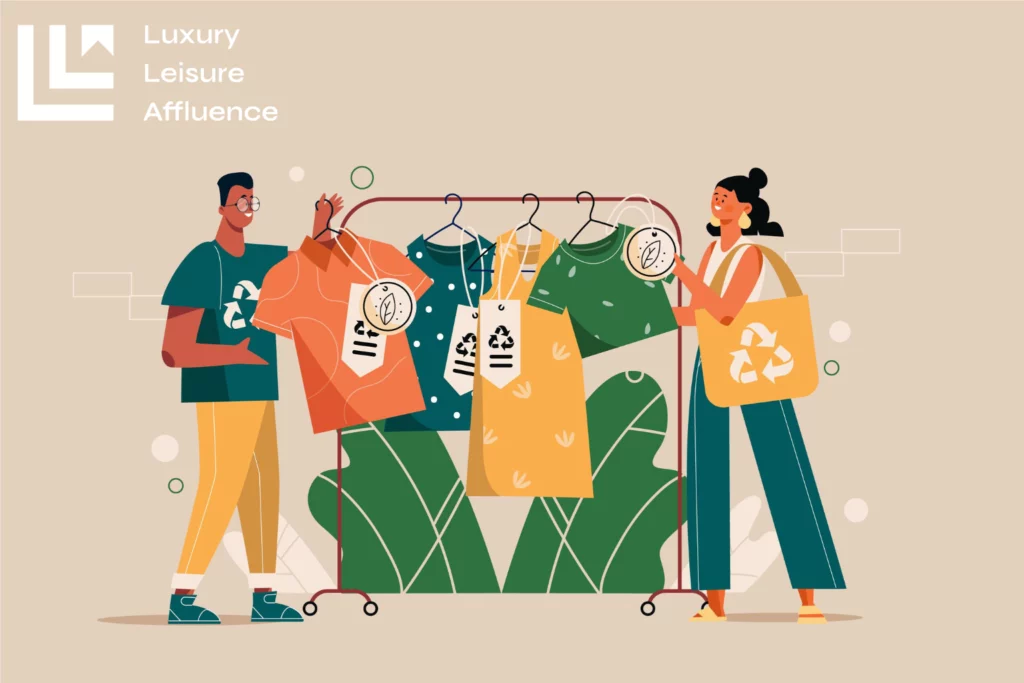
Why Can Luxury Brands Drive Sustainability?
Luxury brands also recognise the shifting attitudes of luxury consumers, particularly millennials, who increasingly care about the environment and seek out sustainable options. This has prompted luxury brands to incorporate sustainable practices into their business models to appeal to the values of modern luxury shoppers. Additionally, influential figures in the industry, such as Kering’s chief sustainability officer, have been championing sustainability initiatives and emphasising the importance of sustainable brand practices.
Many luxury brands have adopted various sustainability practices, including using ethically sourced materials, reducing carbon emissions in their production processes, and implementing recycling and upcycling programs. Some brands have even launched sustainable product lines or collections to cater to environmentally-conscious consumers.
This shift towards sustainability in the luxury market is a response to consumer demand; it reflects the industry’s recognition of its responsibility to minimise its environmental impact. Luxury brands are increasingly aware of the need to adopt sustainable practices to remain relevant and competitive in today’s market.
In addition to incorporating sustainability into their business practices, luxury brands have also been using their platforms to raise awareness about environmental issues and promote sustainable living. This includes partnering with environmental organisations, supporting eco-friendly initiatives, and advocating for responsible consumption.
Ultimately, embracing sustainability by luxury brands indicates a larger shift in consumer values and expectations. As the demand for sustainable products and practices grows, luxury brands are moving towards a more environmentally-conscious approach to meet their consumers’ needs and preferences. By doing so, they adapt to the changing market and contribute to global efforts towards a more sustainable and eco-friendly future.
Luxury Brands and Their Sustainability Initiatives
Luxury brands are incorporating renewable energy sources, sourcing sustainable materials, and reducing their carbon footprint. From using ethically sourced textiles to investing in renewable energy, luxury fashion brands are adapting to meet the demands of environmentally conscious luxury shoppers.
This shift reflects a growing awareness within the luxury sector that sustainability is not just a trend but a necessity. By aligning with sustainability initiatives, luxury brands can appeal to a new generation of consumers who care about the environment and the impact of their purchases.
There is no denying that sustainable luxury is challenging traditional business models. Still, it also presents an opportunity for the luxury industry to redefine itself and embrace a more environmentally conscious future.
1. Cartier
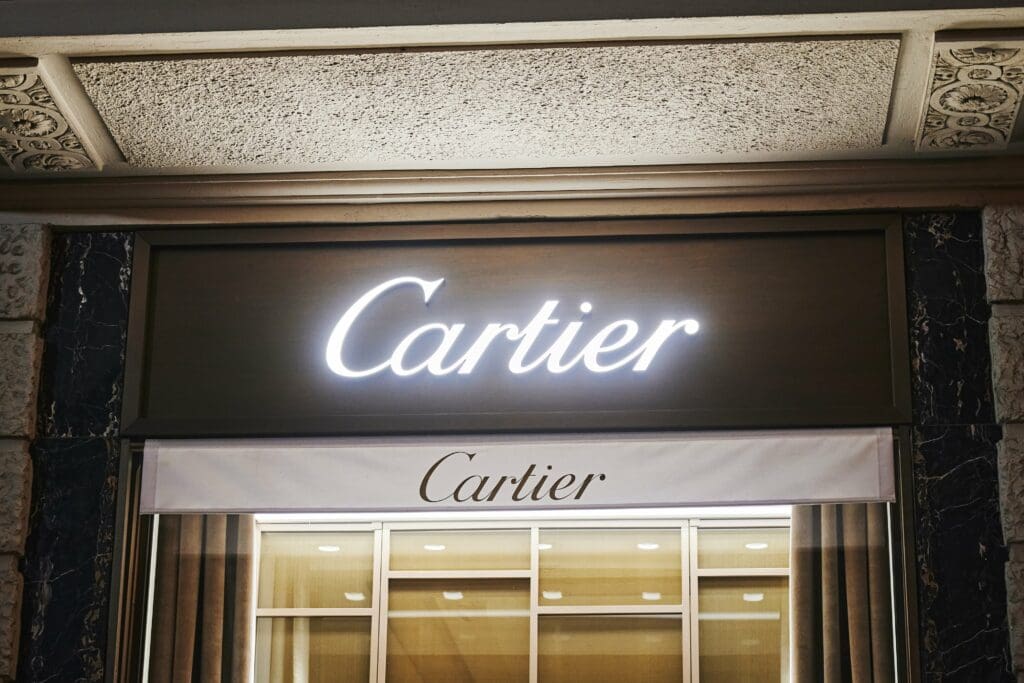
Cartier, a renowned luxury brand, has been committed to reducing its environmental footprint by implementing sustainable practices. It has demonstrated its dedication to sustainability in the luxury sector, from responsibly sourced materials to energy-efficient processes.
One of Cartier’s key initiatives is using responsibly sourced materials in their production process. This includes sourcing ethical gold and diamonds that adhere to strict environmental and social standards and utilising recycled metals and gems whenever possible. By doing so, Cartier supports responsible mining practices and reduces the environmental impact of their supply chain.
Minimising Energy Consumption
Additionally, Cartier has been proactive in minimising their energy consumption and greenhouse gas emissions. They have implemented energy-efficient technologies in their manufacturing facilities and stores, reducing water usage and waste production. This commitment to sustainable practices helps mitigate Cartier’s environmental impact and sets a positive example for other luxury brands to follow suit.
Cartier’s commitment to sustainability sets a high standard for the luxury sector. Cartier demonstrates that luxury and sustainability can coexist by embracing responsible sourcing, energy efficiency, and environmental advocacy. As consumers increasingly prioritise ethically produced and environmentally friendly products, Cartier’s efforts to reduce its environmental footprint will undoubtedly strengthen its position as a leader in the luxury industry.
2. Chanel
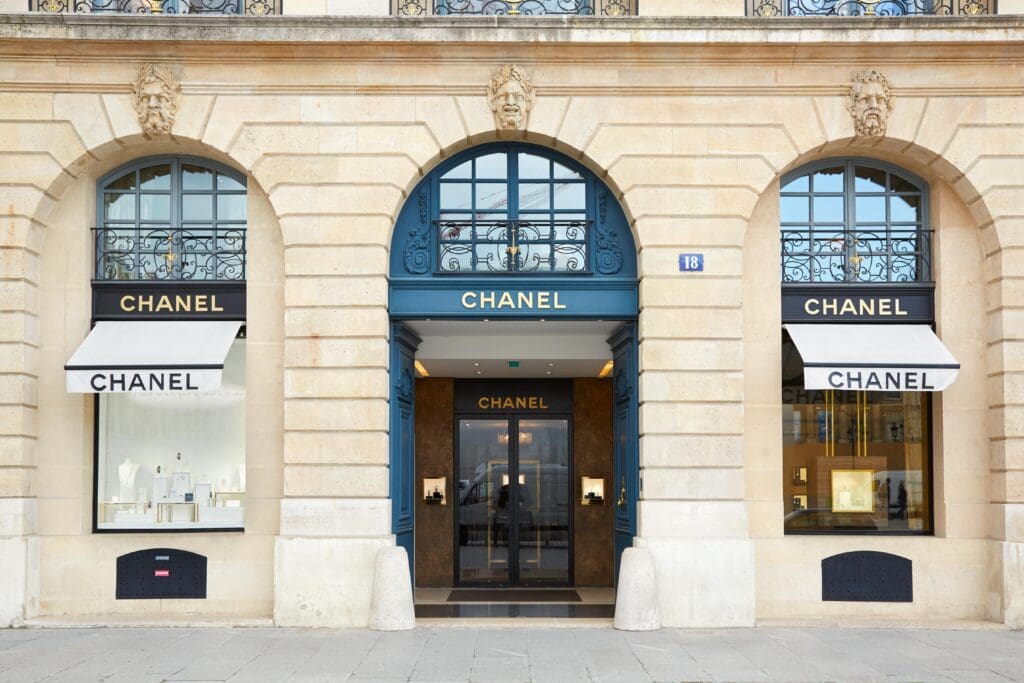
Chanel has also taken significant steps towards sustainability by using eco-friendly materials and supporting renewable energy sources. The brand has made substantial efforts to minimise its environmental impact and promote environmentally conscious practices in the luxury fashion industry.
Chanel has committed to using sustainable and recycled materials in its products, including responsibly sourced gold and diamonds and eco-friendly textiles such as organic cotton, linen, and silk. The brand also actively supports initiatives to protect forests and reduce deforestation in the fashion supply chain.
Optimising the Use of Resources
Furthermore, Chanel has taken steps to minimise waste and optimise its use of resources. The brand has implemented recycling programs for packaging and materials and has worked to reduce single-use plastics in its operations.
Chanel’s commitment to sustainability extends beyond its practices to include partnerships with environmental organisations and advocacy for sustainable practices across the luxury fashion industry. The brand has used its platform to raise environmental awareness and support initiatives promoting responsible and ethical practices.
Overall, Chanel’s efforts towards sustainability demonstrate a commitment to reducing its environmental impact and promoting a more environmentally conscious approach to luxury fashion. By incorporating eco-friendly materials, investing in renewable energy, and advocating for sustainable practices, Chanel sets an example for the industry and works towards a more sustainable future.
3. Moncler
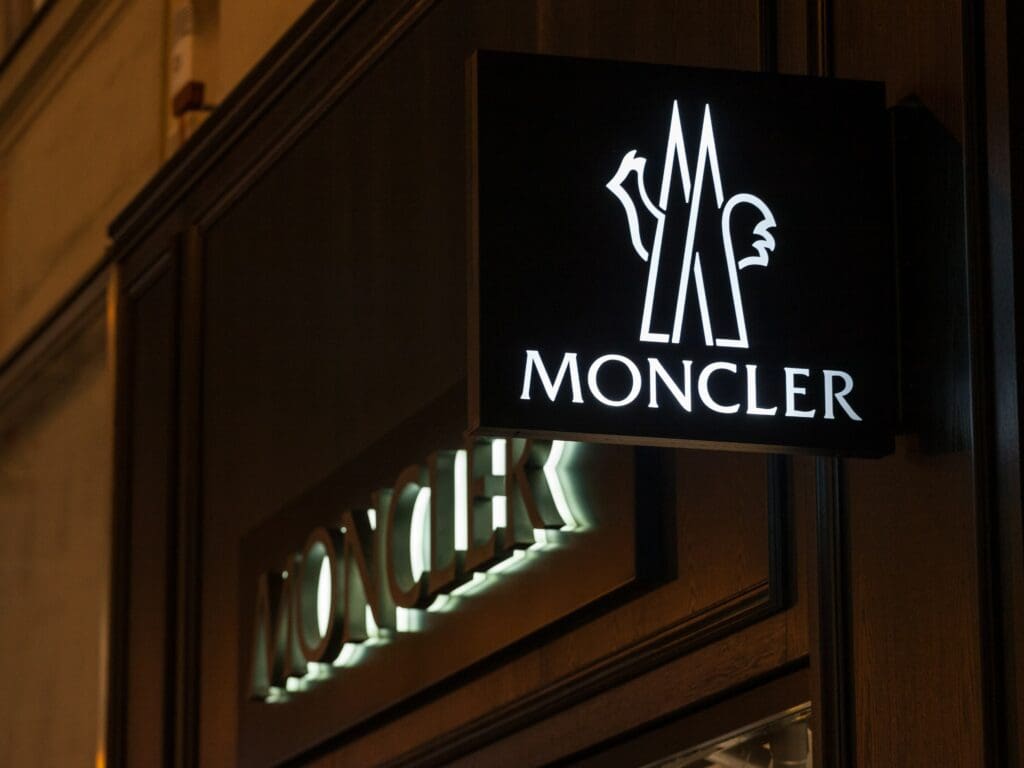
Moncler, known for its high-end garments, has proactively integrated sustainability into its business model. Through sustainable supply chain management and environmentally friendly initiatives, Moncler aims to redefine the concept of sustainable luxury in the fashion industry.
One of the key initiatives that Moncler has implemented to promote sustainability is its commitment to using responsibly sourced materials. The company has partnered with organisations such as the Responsible Down Standard (RDS) and the Global Organic Textile Standard (GOTS) to ensure its products are made with ethically sourced and environmentally friendly materials.
Ethical Labour and Social Responsibility
Moncler also promotes ethical labour practices and social responsibility throughout its supply chain. The company works closely with its suppliers to ensure workers are treated fairly and provided with safe working conditions. By promoting social responsibility, Moncler aims to positively impact the communities in which it operates.
Moncler’s dedication to sustainability extends beyond its products and is integrated into all aspects of its business. Moncler is leading the way in redefining sustainable luxury in the fashion industry by prioritising responsible sourcing, environmental stewardship, and social responsibility.
4. LOEWE
LOEWE has embraced sustainability by incorporating eco-friendly materials and reducing wasteful practices in its luxury goods production. The brand’s commitment to sustainability reflects a growing trend among luxury brands to prioritise environmental consciousness.
In addition to using environmentally friendly materials, LOEWE has also taken steps to reduce its carbon footprint by implementing energy-efficient production processes and reducing waste in its supply chain. The brand’s dedication to sustainability is evident in its use of recycled and upcycled materials and its support for ethical and transparent sourcing practices.
Partnerships with Sustainable Organisations
Furthermore, LOEWE has established partnerships with sustainable organisations and initiatives focusing on environmental conservation and social responsibility. This includes initiatives to support local communities and promote fair labour practices within its supply chain.
As sustainability continues gaining importance among consumers, LOEWE’s dedication to environmental and social responsibility aligns with consumer values and sets a standard for the industry. With its efforts to prioritise sustainability, LOEWE is proving that luxury and sustainability can go hand in hand.
5. Burberry
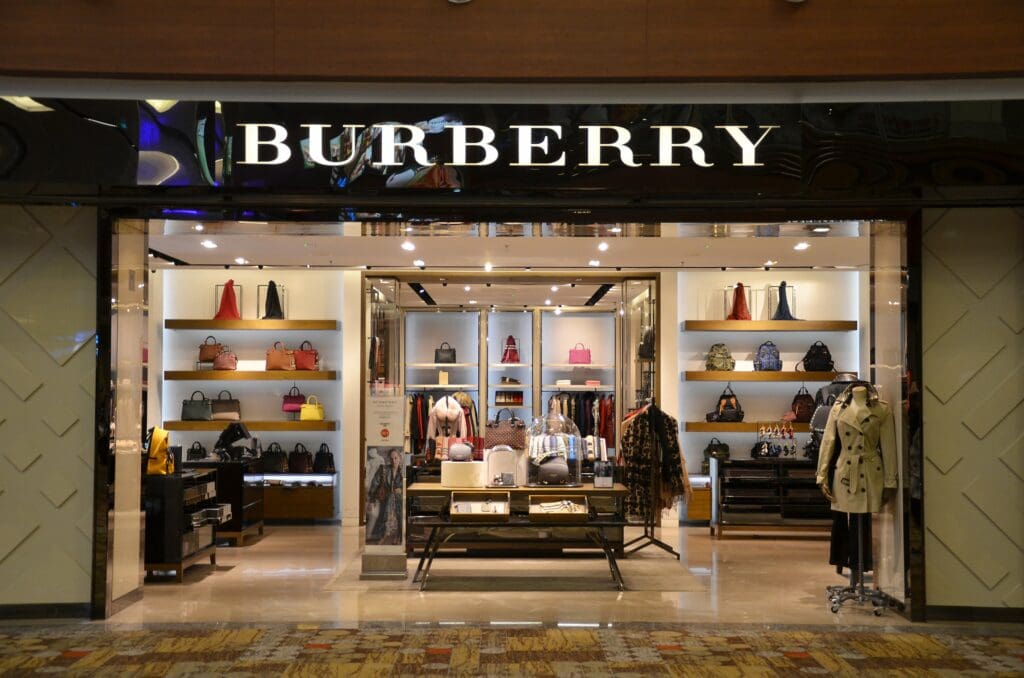
Burberry, a prominent luxury fashion brand, has been actively working towards reducing its carbon footprint and adopting sustainable practices. By embracing environmentally friendly measures, Burberry drives positive change in the luxury fashion industry.
Some key sustainability initiatives that Burberry has implemented include reducing its greenhouse gas emissions by 95% and sourcing 75% of its cotton from sustainable sources. The company has also committed to phasing out hazardous chemicals in its supply chain. It has been working to eliminate single-use plastics in its operations.
Renewable Energy Sources
In addition to these efforts, Burberry has been investing in renewable energy sources, such as solar power. It has also been working to minimise waste and water usage in its manufacturing processes. The company has focused on promoting ethical labour practices and supporting local communities through initiatives like the Burberry Foundation, which aims to empower young people and foster creativity.
Overall, Burberry’s efforts towards reducing its carbon footprint and embracing sustainable practices are an important step forward for the fashion industry. As consumer demand for sustainable products grows, brands must take responsibility and make changes that benefit the planet. Burberry is setting a commendable example for the rest of the luxury fashion industry.
6. Stella McCartney
A celebrated fashion designer, Stella McCartney has been a trailblazer in sustainable luxury fashion, demonstrating that luxury and environmental responsibility coexist. With a focus on eco-friendly materials and ethical production, Stella McCartney has set a high standard for sustainability in the luxury sector.
Stella McCartney’s commitment to sustainability is evident in all aspects of her brand. She has been a pioneer in using alternative, eco-friendly materials such as organic cotton, recycled polyester, and sustainable viscose in her collections. McCartney also avoids using leather and fur in her designs, opting for faux alternatives.
Ethical Production Practices
In addition to consciously sourcing materials, the brand prioritises ethical production practices. McCartney ensures that her garments are produced in factories with fair labour practices, and she actively works to minimise her carbon footprint throughout the production process. Her commitment to sustainability is reflected in the transparency of her supply chain and her dedication to reducing waste and energy consumption.
As a fashion designer, McCartney has shown that creating beautiful, high-quality garments is possible while still being mindful of the planet and its resources. Her dedication to sustainability has inspired other fashion brands to follow suit, and her influence continues to shape the future of luxury fashion. Stella McCartney has revolutionised the way we think about luxury fashion and set a new standard for being a responsible and conscious fashion designer.
7. Vivienne Westwood
Vivienne Westwood, known for her commitment to sustainable fashion, has been a vocal advocate for eco-friendly practices in the luxury market. Her emphasis on sustainable fashion and environmentally conscious business models has influenced many luxury brands to prioritise sustainability.
Westwood has used her platform to raise awareness about fast fashion’s negative impact and urged consumers to buy less and invest in high-quality, timeless pieces. She has also incorporated sustainable materials into her collections, such as organic cotton, recycled fabrics, and ethically sourced materials.
Advocating for Systemic Change
In addition to her work in sustainable fashion, Vivienne Westwood has spoken out about the need for systemic change in the fashion industry, calling for greater transparency and accountability in supply chains and production processes. She has advocated for fair wages and working conditions for garment workers and has used her brand to support various environmental and social causes.
Through her advocacy and leadership, Vivienne Westwood has inspired other luxury brands to take action on sustainability, leading to a shift towards more ethical and environmentally friendly practices in the fashion industry. Her commitment to sustainable fashion has significantly impacted the industry, demonstrating that luxury brands can prioritise style and sustainability.
In conclusion, sustainable luxury fashion brands are at the forefront of driving positive change in the industry. By prioritising ethical production practices, environmentally friendly materials, and fair labour conditions, these brands are setting a new standard for the fashion market. It is inspiring to see the innovative ways they incorporate sustainability into every aspect of their business, from design to manufacturing to distribution.
As consumers, we have the power to support these brands and demand more sustainable options in the fashion industry. Together, we can create a more sustainable and ethical future for fashion, one purchase at a time.
FAQs
What does sustainable luxury mean?
Sustainable luxury means the ability to obtain luxury items such as clothes, cars, food, and more without having a negative impact on the environment. Many luxury brands around the world, such as Chanel, Cartier, Vivian Westwood, and more, have embraced sustainable production.
Is Gucci a sustainable company?
Gucci has embraced sustainable production by being carbon-neutral in its operations and supply chain since 2018. Being carbon-neutral means the company emits as much carbon dioxide as it consumes, resulting in a balance that does not affect the environment negatively.
Is sustainable fashion a luxury?
Sustainable fashion means buying fewer clothes while investing in better-quality items. These items might be expensive but will last longer, resulting in less waste and more sustainability. Buying sustainable fashion might be considered a luxury as most people cannot afford to buy expensive luxury clothes even if they will last longer.
Which luxury brand is most sustainable?
Stella McCartney has been recognised as one of the most sustainable luxury brands in the world. The company’s eco-friendly policies have garnered many environmental awards as well as recognition among peers. The brand uses organic, recycled and eco-friendly materials.











